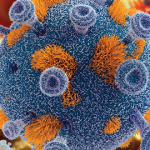Rheumatologists treating HIV patients in 2017 must think through many important factors as this population ages. As we continue to learn, rheumatologists must consider important drug–drug interactions, relatively uncommon rheumatological presentations of HIV, as well as specific diagnostic challenges. Working closely with infectious disease specialists is the best way to achieve optimum care for this patient group.
Rheumatic Issues & HIV: Background
Relatively soon after the onset of this human immunodeficiency virus (HIV) epidemic in the 1980s, clinicians and researchers began describing a number of different rheumatic problems associated with the disease. Very early on, researchers described such symptoms as reactive arthritis.1 They found that HIV patients suffered from a dramatic immunodeficiency, leaving them susceptible to a variety of opportunistic infections, some of which had symptoms that required treatment input by rheumatologists.2
Researchers eventually learned that initial infection with HIV is sometimes accompanied by myalgias, arthralgias and other symptoms, although it is often not diagnosed at the time. Moreover, it became evident that a wide variety of rheumatic problems occurred in many patients with active HIV, among them general myopathy and arthropathy, infectious arthritis, inflammatory myopathies, vasculitis, rheumatoid arthritis, seronegative spondyloarthritidies, psoriatic arthritis and avascular necrosis. Although rheumatic manifestations of HIV are thought to be possible at all stages of HIV infection, many appear to be most common in the advanced, untreated stages of the disease.1,3-7
Rheumatology Care for HIV-Positive Patients After cART
The prognosis for patients with HIV changed dramatically with the introduction of combination antiretroviral therapy or cART (previously known as highly active antiretroviral therapy or HAART). These therapies, first introduced in the late 1990s, began to usher in a new era of improved HIV prognosis.2 Clinicians began to use these drugs in specific combinations to keep viral loads of HIV extremely low and CD4+ immune cells levels high, thus preventing opportunistic infections.2
Since the introduction of these new treatments, mortality from HIV has decreased dramatically.2 In areas of the world where such treatments are readily available, unmanageable opportunistic infections from HIV are uncommon. HIV has morphed from a universally untreatable and fatal illness into a manageable chronic illness. It is, however, one that poses continued health challenges, including metabolic changes, cardiovascular disease and liver problems.8 As of 2013, people aged 55 and older made up more than a quarter of the estimated 1.2 million people living with HIV infection in the US.9
All of this has dramatic implications for the rheumatologist caring for patients who are HIV positive. Rheumatologists in the U.S. now see far fewer patients who are dealing with severe, direct rheumatic consequences of uncontrolled HIV.


